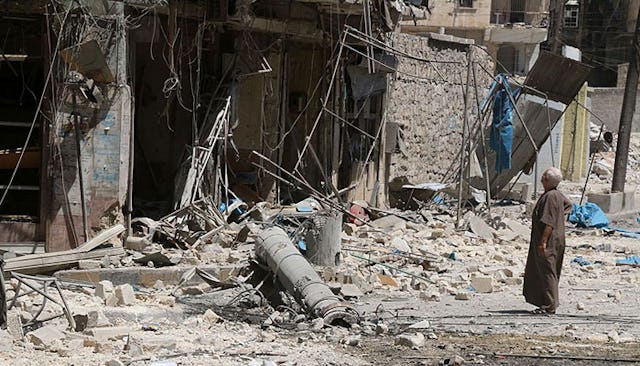The Children Of Aleppo: What We Can't Ignore

The pit that has sat in my stomach all day still sits firmly in place. When I logged onto Facebook the morning of August 18 and saw the ghostly image of 5-year-old Omran Daqneesh, hollowly staring out of the back of a Syrian ambulance in hell-torn Aleppo, I physically felt the wind being knocked out of me and tears pricking the back of my eyes.
War is horrific — there is nothing new in that statement, nothing earth-shattering or enlightening. But seeing an innocent child, a 5-year-old, shoved onto the global stage as a result of years of unfathomable violence in a corner of the earth that has basically been regarded as the buzzing mosquito that won’t go away, rips into us in a raw, graphic way. The White Helmet volunteer who carried Daqneesh to the ambulance told NPR that this is an every day occurrence. “Just this time it was caught on camera.”
If you haven’t read or watched Clarissa Ward’s address to a UN Security Council meeting last week, I highly recommend you give it a listen. Put aside whatever strong feelings you have for CNN and just listen to her words. You need to know what is happening in Syria. In her address, she gives the Council a play-by-play of her coverage of the conflict and on the ground revelations.
Toward the end of her address, she emphasizes just how horrific the situation (is that even an appropriate term?) really is. “This is actually hell,” she states in reference to the feeling of exhaustion from being petrified all the time. “This is what hell feels like, and there is no way it can get any worse than this. But it did. It got a lot worse. Much worse.”
Let’s all peel back the jaded film that has formed over our eyes and brains from too much media sensationalism and really think about that for a minute. Ward literally likens Aleppo to being in hell. It is unlike anything the majority of us have ever known or experienced.
The image of Daqneesh is not the first time we’ve felt the impact of innocence in tragic circumstances. I never had as strong an emotional reaction to a news story as I did when the image of 3-year-old Alan Kurdi, a Syrian refugee, lying facedown dead on a beach in southern Turkey showed up in the news in September 2015. I actually full-on cried.
The parent inside of me wailed. I couldn’t bear the pain that the mother or father of that little boy felt or would come to feel upon realization that he was gone. I felt like someone had sucker-punched me in the stomach, and I could feel the back of my throat start to close up, choking with tears. “Don’t look at that,” my husband said. “I have to,” I replied.
I saw my own son in that photo, lying there fully clothed, body soaked by the sea, “humanity washed ashore” as the Turkish media and social media tagged the incident. That morning as I drove to work, the NPR radio morning show host was interviewing a spokesperson, himself a parent, from Human Rights Watch on the tragedy of Kurdi.
The interview was uncomfortable. Neither side could really bring themselves to have a thoughtful, journalistic discussion about what had happened. “What I can’t stop thinking about is his shoes,” the spokesperson said, his voice tinged with horror. “Think about it. That morning, his parents dressed him and put his shoes on his feet, knowing the danger they were headed into when they got on that boat, knowing the journey that lay ahead. All for a better life.” I lost it in the car.
Back to the present day, my almost 4-year-old is sleeping next to me, arms and legs everywhere, his stomach moving silently up and down. He’s deep in sleep. There are no sounds of artillery or gunfire or destruction happening on our quiet street in the Chicago suburbs. Our house is intact; we have running water, electricity, and food in the fridge.
The pit in my stomach remains. I can tell it will be here for a while. It could have been him.
This article was originally published on